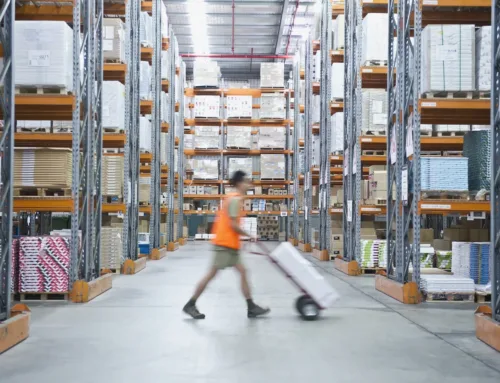Wonolo
Demand for goods and services, particularly via e-commerce, continues to increase as the U.S. slowly recovers from the COVID-19 pandemic. To keep up with this demand, companies must staff their warehouses appropriately, which has proven to be difficult. The unemployment rate remains high, but many companies report that they cannot find workers for their open jobs. This has made it even more important for companies to retain the workers they have so they can continue to operate at full capacity and keep up with demand.
In e-commerce fulfillment centers, labor supply is even more in demand due to the higher number of workers required per square foot. In a non-fulfillment operations warehouse, the typical number is one worker per 1,500 to 3,000 feet whereas e-commerce fulfillment operations require one worker per 700 to 1,000 square feet.
Challenges in recruiting and retaining warehouse workers have led some companies to increase wages or offer other incentives. For example, Amazon reports that they are looking to hire 75,000 warehouse workers to staff up for Prime Day 2021. The average starting pay for those jobs is $17/hour, and Amazon is offering extra bonuses to workers who are fully vaccinated against COVID-19. These are just some of the available strategies to help companies find qualified warehouse workers in the current labor market.
The challenges of warehouse staffing aren’t just limited to having big numbers to fill like Amazon or other major retailers. A variety of reasons make the task tricky, including:
- Overall demand for labor due to the growth of e-commerce
- Warehouses located in concentrated areas, limiting the labor pool and driving up competition for workers
- Importance of branding and word-of-mouth for warehouse work
Why Finding and Retaining Workers is a Challenge in Dallas, TX
Apart from having very large warehouses to fill, supply chains struggle to find and keep labor for several reasons. One factor is that it is .difficult for warehouses to differentiate themselves to attract prospective workers, particularly in concentrated areas where many competing warehouses are located.
The concentration of jobs in medium-to-large metropolitan areas means warehouses must compete for a limited pool of workers in a given area, driving up competition and wages. Compared to retail work, for which small metro or rural areas account for 23% of jobs, only 13% of e-commerce work is distributed across small cities and rural regions. Accordingly, if you’re looking for warehouse staffing in Dallas, Texas, you will likely experience more competition than if you were operating in a smaller metro area.
The cluster of warehouses in a limited area naturally leads to companies competing for the same pool of workers. Wage increases help make jobs more attractive, but the struggle to fill warehouses still remains since all warehouses can increase wages. The competition stays even as low wages fall away.
Once the number of available jobs surpasses the number of job applications and increased wages aren’t enough to lure workers away from competitors, companies in Dallas, Texas, and across the country that traditionally uses online staffing platforms may need to use other approaches to differentiate themselves to attract workers. Warehouses often rely on word-of-mouth from former or current workers to attract workers who don’t always have previous work experience. This means branding and reputation are crucial for attracting new workers.
Since warehouse jobs are physically demanding, prospective workers may choose to forgo the good pay for less physically demanding jobs. Even workers who are already working in warehouses, with no other benefits, may switch jobs as soon as a competitor offers higher pay or other perks, resulting in a high turnover rate. Other factors, such as the fair treatment of workers, the flexibility of shifts, a safe warehouse facility, and perks, matter.
What To Do When a Higher Wage Isn’t Enough
Competition for warehouse workers is so fierce that when SHRM Online reached out to HR managers for an interview, many of them turned it down, citing concerns about “revealing best practices and insights.”
Though there’s no one magic answer, companies by and large are employing similar approaches to find workers and keep them happy. These include offering bonuses, flexible schedules, and positive workplace culture. Overall, those who are hiring for warehouses are stepping up efforts to engage workers and keep them happy.
Bonuses, Gift Cards, and Gas Cards
One common approach that companies are using to recruit and retain workers is to offer hiring bonuses and extra cash for workers who stay with the company. For example, at Radial, employees can receive $200 attendance bonuses during holiday seasons and $100 gift cards from Zara.
Other types of bonuses like those for referrals are common as well. Referral bonuses in particular are mutually beneficial to both the workers and the company. Since warehouses are often short on reliable labor, a referral from a reliable worker has a great chance to work out positively.
Interestingly, some managers noted that “a gas card has more value than a 401(k)” when it comes to benefits. For many workers who are just starting out and don’t have a lot of experience, more immediate benefits like bonuses, gift cards, and gas cards do more to alleviate their financial needs (and hold more appeal) than long-term benefits like a 401(k).
Wonolo makes perks available to workers on the platform via Wonolo Up. Wonolo Up gives workers access to a range of portable benefits, including health insurance and flex-time off. This can be a big incentive for workers to utilize Wonolo to connect with companies, which in turn benefits companies looking for experienced workers in a competitive labor market.
Flexible Shifts and Paid Breaks
When financial incentives aren’t enough, workplace conditions can do a lot to improve retention as well. Flexible shifts not only allow workers to schedule their own hours to accommodate various personal needs, but also allow companies to look for nontraditional workers, including working parents, retirees, and those with second jobs.
Paid lunch breaks also significantly impact worker retention. According to Holly Courter, Senior HR Manager for a Romark Logistics unit, workers at the warehouse remain on the clock during lunch, in addition to the ability to choose their shifts between 8, 10, and 12 hours, as well as weekend options.
When workers use Wonolo, they choose the particular jobs they accept, and the particular days and times at which they work, which helps give them the flexibility they need.
A Worker-Friendly Culture and Advancement Opportunities
Other warehouse HR approaches aren’t so different from those at white-collar workplaces. A worker-friendly environment that places the personal needs and concerns of warehouse workers first goes a long way in building a solid reputation as a top company to work at.
Some of the factors to consider when building a positive workplace culture include: engaging with workers one-on-one, creating flexible policies that support workers, providing sufficient time for breaks and lunch, fostering a safe workplace, and clearly communicating expectations. Particularly as businesses deal with the lingering impacts of the pandemic, workplace safety will continue to be top of mind for many workers. Overall, companies with a positive workplace culture are attractive places to work, which will go a long way toward recruiting and retaining qualified workers.
Find Workers with Wonolo
Unlike traditional online staffing platforms, Wonolo can help your business connect with experienced and ready-to-work workers in Dallas, TX faster and with fewer headaches. Plus, bringing in temporary workers to meet your business goals is a great way to find out what kind of worker thrives at your company. You may even want to convert a temporary worker to a different, full-time role. Wonolo helps simplify that process because you know how these workers perform at your business before making any hires for full-time roles. Wonolo is a valuable tool to utilize as you try to find warehouse workers.






